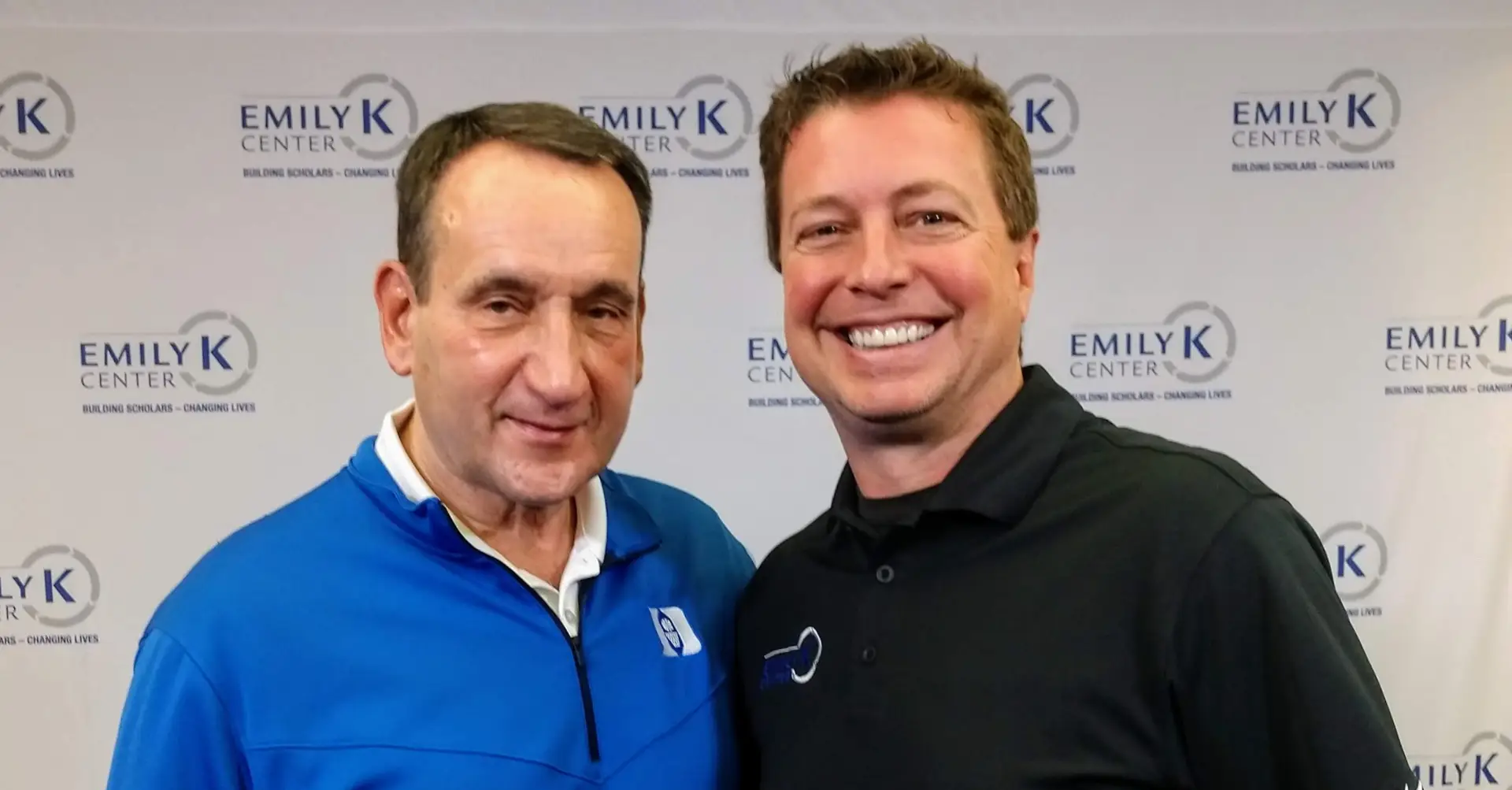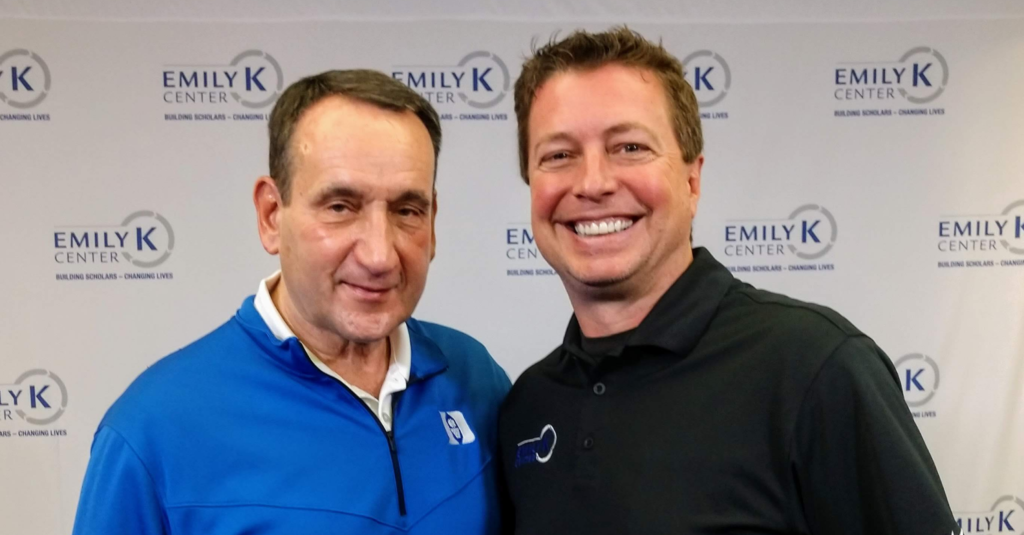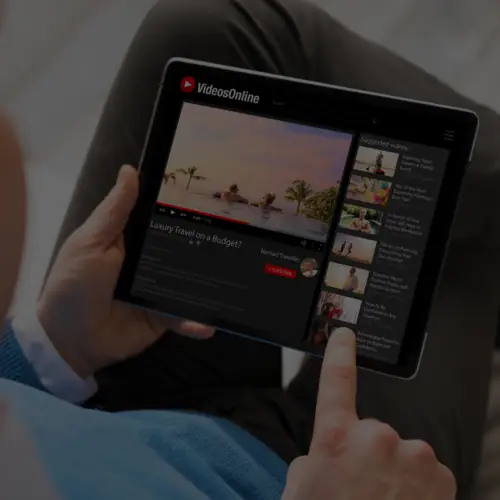
01 Dec Life Lessons I Learned From Coach K

Over the course of his long career, Mike Krzyzewski has passed along his wisdom to hundreds of college and Olympic basketball stars. I am not one of them.
But despite my lack of basketball acumen, I’ve had the good fortune to spend time with Coach many times over the last decade, including for six years as a board member of the Emily K Center, a college preparedness non-profit he chairs that is named after his mother.
Getting the chance to watch him work with his team, basketball staff, friends, and fellow board members helped me absorb some powerful life lessons I apply to my business life, far from the court. Here are just a few:
Standards Are Contagious
The Duke basketball team runs on standards, set each year by the team, rather than rules. While many of them are basketball-focused, it’s clear the overarching theme is that excellence, or at least striving for it, is the expectation.
I’ve seen this applied at the Emily K Center. Both explicitly and implicitly, the message is delivered that the Center will operate with excellence across all areas of operation. Before long, these are not Coach K’s standards. These are the organization’s standards, and it’s interesting to watch the staff make decisions through the lens of these standards without even thinking about it.
Motivate With the Why
In a lot of meetings, it’s tempting to jump into the minutiae, to attack the meeting agenda, get the decisions made and move on to the next thing. One of Coach’s strengths is his ability to take a step back, move the group up a level and remind them of what we’re all working to achieve. It’s quite motivating.
While it’s no surprise that the winningest college coach of all time would be a great motivator, what I took from this lesson isn’t about him. It’s about the way the group feels when he does it. Reminding people of the “why” periodically is a skill any leader can use.
It’s Always a Team Sport
While basketball has only five players on the court at a time, if you spend any time around a major program, you’ll see just how deep that team really goes. Coaches, managers, trainers, doctors, operations staff, cleaning staff, and so on.
What I’ve seen in my interactions with Coach K is his knowledge of (and interest in) the roles played by people outside of the limelight. This may be a natural result of his humble upbringing (his father was an elevator operator, and his mother was a cleaning lady), but it’s also an understanding that the team doesn’t operate at a high level if everyone doesn’t play their role. After all, each role wasn’t important, it wouldn’t (or shouldn’t) exist. So if the role is important, the person playing that role deserves your respect.
Don’t Be Afraid to Lead
There’s a lot of talk on social media these days about “imposter syndrome,” where someone in a leadership role doesn’t feel like they are good enough to be there. It’s a real thing and I’ve felt it myself more than once.
When you see Coach K now, with his five national championships, his Olympic medals, and all the other accolades lining the walls of his office, it’s easy to forget he started as a new coach at Army. It’s also easy to forget that after three years at Duke, many fans wanted him fired.
I once asked him how he recruited in 1981, before any of the victories. His answer? “Exactly as I do today. Tell them the truth on where you’re working to go next.” In other words, he accepted the leadership role and shared his vision long before it became obvious he would be great.
Pass the Dang Ball
Now, this is one I’d hear a lot from Coach if I actually played for him. As he enters his final season, he’s passing more and more to Jon Scheyer, the head coach in waiting, and the rest of his staff. But this is the continuation of a process he began a decade ago.
No one player, no one staff member, can or should do it all. To be successful, each person needs to get a chance to have the ball and do what they do best. Moving the ball leads to easy scores.
This All Applies to Work
It’s clear to me that all of these lessons apply to my life. Certainly, it’s occurred to the coach as well. That’s probably why he has the Coach K Center on Leadership and Ethics at Duke’s Fuqua School of Business, and why he’s written books like Leading with Heart and The Gold Standard.
It’s easy to be distracted into thinking this is all just about sports. For me and so many others in other walks of life, these lessons are about much more.
If you’re interested in learning more about what’s happening in the social space, subscribe to our Social You Should Know newsletter. Sign up today using the form below!
Subscribe to Socials You Should Know







